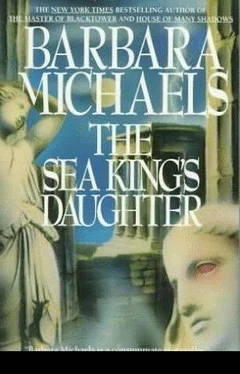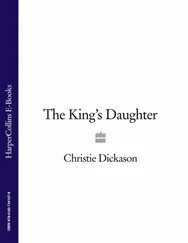Barbara Michaels - The Sea King’s Daughter
Здесь есть возможность читать онлайн «Barbara Michaels - The Sea King’s Daughter» весь текст электронной книги совершенно бесплатно (целиком полную версию без сокращений). В некоторых случаях можно слушать аудио, скачать через торрент в формате fb2 и присутствует краткое содержание. Жанр: Детектив, на английском языке. Описание произведения, (предисловие) а так же отзывы посетителей доступны на портале библиотеки ЛибКат.
- Название:The Sea King’s Daughter
- Автор:
- Жанр:
- Год:неизвестен
- ISBN:нет данных
- Рейтинг книги:3 / 5. Голосов: 1
-
Избранное:Добавить в избранное
- Отзывы:
-
Ваша оценка:
- 60
- 1
- 2
- 3
- 4
- 5
The Sea King’s Daughter: краткое содержание, описание и аннотация
Предлагаем к чтению аннотацию, описание, краткое содержание или предисловие (зависит от того, что написал сам автор книги «The Sea King’s Daughter»). Если вы не нашли необходимую информацию о книге — напишите в комментариях, мы постараемся отыскать её.
The Sea King’s Daughter — читать онлайн бесплатно полную книгу (весь текст) целиком
Ниже представлен текст книги, разбитый по страницам. Система сохранения места последней прочитанной страницы, позволяет с удобством читать онлайн бесплатно книгу «The Sea King’s Daughter», без необходимости каждый раз заново искать на чём Вы остановились. Поставьте закладку, и сможете в любой момент перейти на страницу, на которой закончили чтение.
Интервал:
Закладка:
So I spent a couple of days in London and a couple of days in Paris, seeing the sights and sending lots of postcards home. I was always with a crowd; there were a lot of people my age traveling, and it’s easy to spot a fellow student, whatever his or her nationality. I said good-bye to Mike and Sally and Joe in Paris, and met another group in Athens. We visited the Plaka together, and I learned how to do that Greek dance, the kind where the dancers have their arms around each other’s shoulders.
Oh, yes, we went up to the Acropolis one afternoon. If they would only fix the place up, it would be rather impressive. There’s no reason why they can’t patch the holes and put up some new columns.
I mention this not to show what a boor I am, but because my lack of response to the great antiquities of Greece proves that I am not susceptible to that sort of thing. I had no emotional reaction to the place, and it’s a place that brings out the hidden romanticism in many people. “The birthplace of democracy… The stones trodden by the sandals of Socrates…” That sort ofthing.
Which makes my experience in Crete all the more peculiar.
I hated to leave Athens. I had met this guy named Aristotle-really-who was a student at the university, and he was showing me parts of Athens most tourists don’t see. He wanted to show me some other things, too; and although I was having fun, I decided maybe it was time to move on. I wanted to spend a couple of days in Crete, to keep up my tourist pose, before I went to Thera. I suppose I was overdoing the camouflage, but I rather enjoyed it; it made me feel like Mata Hari.
I took a boat. There were quite a few other students on board, and we stayed up most of the night singing and talking. The cabins were stuffy little cubicles with four or five people in each of them. I guess every safety regulation was violated on that boat, especially the one that limited the number of passengers. I figured if we hit a rock or something, I’d have a better chance on deck, so instead of going to bed with my four roommates, I just lay down on the deck when I got sleepy.
When I woke up, with the sun shining down on my face, I felt awful-sick and stiff and depressed, the way I’d felt when I had Asian flu. It wasn’t the hard deck or the fact that I’d had only three hours sleep. I had done that plenty of times. I wondered if I was catching some kind of bug, and I lay there for a while with the smell of bilge and sour wine strong around me, regretting my boasts about never getting seasick. Then I remembered the dream.
When I was young I used to have nightmares-not often, but when I did, they were bad. It would take me a long time to fight free of the dream, even after I woke up; I can remember lying in bed in a cold sweat of terror, shaking and sick, before I came fully awake. It hadn’t happened for a long time. Until now.
I felt a little better when I realized that the main thing wrong with me was a bad dream. I tried to recall the details of this one; but the harder I concentrated, the more the memories slipped away, like small wet fish between my fingers. At first all I could remember was that it had something to do with Crete and the old legend-with which I was now very familiar-of Theseus and the Minotaur.
The Minotaur was a good theme for nightmares. Half man, half bull, he was the result of a temporary liaison between the queen of Crete and-right. The queen couldn’t help herself, actually. Poseidon, the god of the sea, had made her fall in love with the bull because her husband had kept the animal for himself, instead of sacrificing it. The Greek gods were always doing things like that. They were a mean, vindictive group of divinities, not nearly so well behaved as the poor humans they harassed.
Anyway, King Minos couldn’t destroy the Minotaur because it was sacred. So he had his brilliant architect, Daedalus, design the Labyrinth as a sort of kennel for the monster, and every nine years he fed it with hostages from the conquered city of Athens-seven young men and seven maidens. One year, when the sacrifice was due, the prince of Athens, Theseus, volunteered for the draft, hoping to kill the monster and save his fellow Athenians.
He wouldn’t have succeeded if the Princess Ariadne, Minos’ daughter, hadn’t fallen in love with him. She gave him a clew, a ball of string, to unwind as he went into the Labyrinth. Without it, he couldn’t have found his way out again, even if he succeeded in killing the monster, which of course he did, being a hero. He took Ariadne with him when he escaped from Crete, but he deserted her before he got home-sailed away, leaving her on an island where they had stopped for provisions. At least that’s what one version of the legend says, and it’s the one I’m inclined to believe. Another version claims Theseus’ ship was blown away by a storm while Ariadne was on shore.
The part I had dreamed about was the part where Theseus meets the Minotaur.
I had seen a picture of that scene in some mythology book. It was a line drawing in black and white-nothing like my dream picture, which had been in living color, complete with all the sensory impressions. As I lay there, the dream came back to me, my memory nudged by the Greek sun beating down on my upturned face, the boat rocking gently under me, the smell of fish and seawater and close-packed bodies…
The walls were rough, rock cut; they dripped with moisture and shone with a rotten greenish luminescence. There was a horrible smell-not the smell of manure and hay, which is wholesome and clean by contrast, but the stench of organic things decaying. The air was thick with it. No wind from outside had entered that place, to sweep it clean, since it was built. This was the heart of the Labyrinth, the lair of the monster. Maybe the outer walls and corridors were man-built and straight; I hadn’t seen that part in my dream-but here, at the very core, the rocky maze seemed to be cut out of the body of the earth itself. The earth mother was the oldest of all the gods, and the slimy, curving corridors were horribly suggestive of the entrails of some gigantic animal. The light pulsated feebly, as if something breathed.
In the center there was darkness, utter and absolute. But I knew something was there. I could sense it, waiting. The man knew it, too. He was afraid. The sweat ran down his face in streams, and yet his half-naked body shook convulsively, as if he were cold. He was wearing a queer short skirt, with a wide belt that shone like metal. It pulled his waist in and made his chest and shoulders look even broader than they were. There was a chain around his neck, with an amulet or locket hanging from it. He had dropped the clew. There was something on the ground at his feet. How could I tell it was a box, the box that held the ball of twine? I don’t know. But I was sure.
Yes, I was there. That was the worst part of the dream. I was there, invisible, impalpable; watching in an agony of fear and hope.
Something stirred in the central darkness. There was a rustling sound, not the rustle of dried grass or hay, but a clicking rattle, like dead bones rubbing together. Then It came out into the light.
Half man, half bull. It’s all right when you see something like that in a drawing. You can accept the grotesque because it is unreal. But this was real-alive and breathing. The mingling of animal and human wasn’t as neat as it is in the illustrations-a well-shaped man’s body with a bovine head, like a mask. This creature was indescribably blended. But the face was human, and that was horrible, because it was aware. It knew what it was, and it felt the same loathing its victims felt-for its own body. Imagine being trapped, not just for a single lifetime, but for eternity, inside something you loathe and despise with a sick hatred… Hate was its only emotion. Hatred for itself and for humanity and for the immortal gods. I caught one glimpse of that ghastly face and blacked out.
Читать дальшеИнтервал:
Закладка:
Похожие книги на «The Sea King’s Daughter»
Представляем Вашему вниманию похожие книги на «The Sea King’s Daughter» списком для выбора. Мы отобрали схожую по названию и смыслу литературу в надежде предоставить читателям больше вариантов отыскать новые, интересные, ещё непрочитанные произведения.
Обсуждение, отзывы о книге «The Sea King’s Daughter» и просто собственные мнения читателей. Оставьте ваши комментарии, напишите, что Вы думаете о произведении, его смысле или главных героях. Укажите что конкретно понравилось, а что нет, и почему Вы так считаете.












